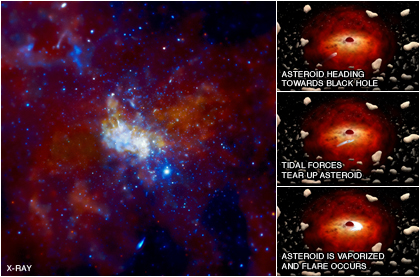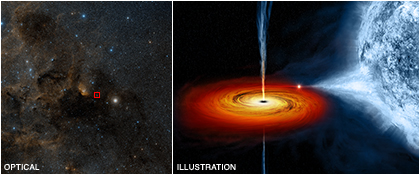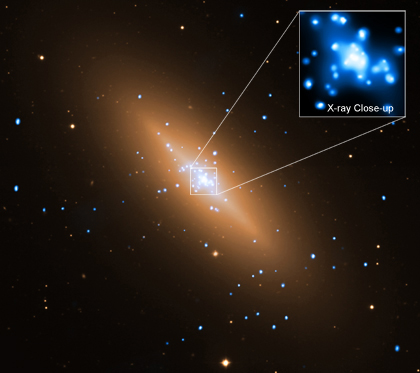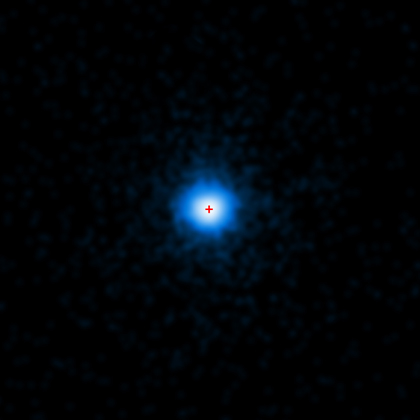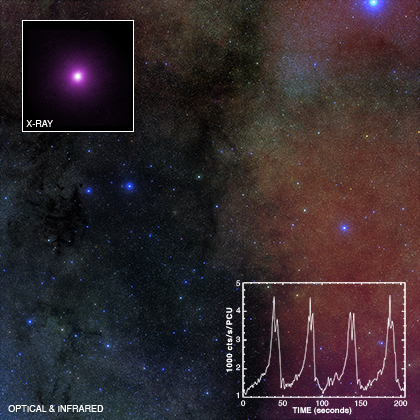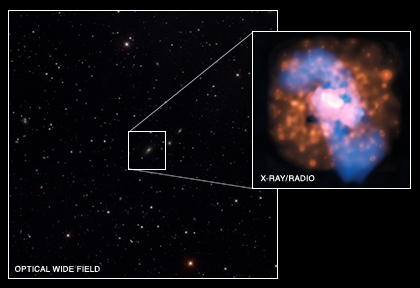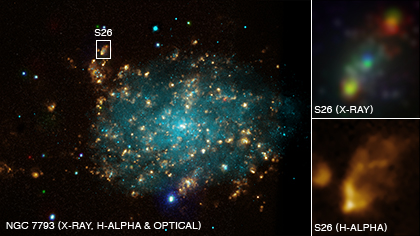Black Holes
NASA's Chandra Finds Milky Way's Black Hole May be Grazing on Asteroids
This image from NASA's Chandra X-ray Observatory shows the center of our Galaxy, with a supermassive black hole known as Sagittarius A* (Sgr A* for short) in the center. Using intermittent observations over several years, Chandra has detected X-ray flares about once a day from Sgr A*. The flares have also been seen in infrared data from ESO's Very Large Telescope in Chile.
NASA's Chandra Adds to Black Hole Birth Announcement
On the left, an optical image from the Digitized Sky Survey shows Cygnus X-1, outlined in a red box. Cygnus X-1 is located near large active regions of star formation in the Milky Way, as seen in this image that spans some 700 light years across. An artist's illustration on the right depicts what astronomers think is happening within the Cygnus X-1 system. Cygnus X-1 is a so-called stellar-mass black hole, a class of black holes that comes from the collapse of a massive star. The black hole pulls material from a massive, blue companion star toward it. This material forms a disk (shown in red and orange) that rotates around the black hole before falling into it or being redirected away from the black hole in the form of powerful jets.
Chandra Images Gas Flowing Toward Black Hole
The galaxy NGC 3115 is shown here in a composite image of data from NASA's Chandra X-ray Observatory and the European Southern Observatory's Very Large Telescope (VLT). Using the Chandra image, the flow of hot gas toward the supermassive black hole in the center of this galaxy has been imaged. This is the first time that clear evidence for such a flow has been observed in any black hole.
Chandra Observes Extraordinary Event
The center of this image contains an extraordinary gamma-ray burst (GRB) called GRB 110328A, observed with NASA's Chandra X-ray Observatory. This Chandra observation confirms the association of GRB 110328A with the core of a distant galaxy and shows that it was an exceptionally long lived and luminous event compared to other GRBs.
Taking the Pulse of a Black Hole System
This optical and infrared image from the Digitized Sky Survey shows the crowded field around the binary system GRS 1915+105 (GRS 1915 for short) located near the plane of our Galaxy. The top-left inset shows a close-up of the Chandra image of GRS 1915 , and the bottom-right inset shows the remarkable "heartbeats" seen in the X-ray light from this system. Using Chandra and the Rossi X-ray Timing Explorer (RXTE), astronomers have discovered what drives these heartbeats and given new insight into the ways that black holes can regulate their intake and severely curtail their growth.
Peering Into The Heart of Darkness
Astronomers have long known that the supermassive black hole at the center of the Milky Way Galaxy, known as Sagittarius A* (or Sgr A* for short), is a particularly poor eater. The fuel for this black hole comes from powerful winds blown off dozens of massive young stars that are concentrated nearby. These stars are located a relatively large distance away from Sgr A*, where the gravity of the black hole is weak, and so their high-velocity winds are difficult for the black hole to capture and swallow. Scientists have previously calculated that Sgr A* should consume only about 1% of the fuel carried in the winds.
Black Holes Go "Mano A Mano"
This image of NGC 6240 contains new X-ray data from Chandra (shown in red, orange, and yellow) that has been combined with an optical image from the Hubble Space Telescope originally released in 2008. In 2002, the discovery of two merging black holes was announced based on Chandra data in this galaxy. The two black holes are a mere 3,000 light years apart and are seen as the bright point-like sources in the middle of the image.
An Oldie But Goodie
Last week, we released the Chandra image of an object known as Cygnus X-1. At first glance, Cygnus X-1 might not look that important - even with Chandra's excellent X-ray vision - but this is one case where it's good not to judge a book by its cover.

